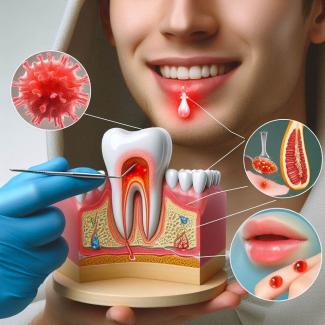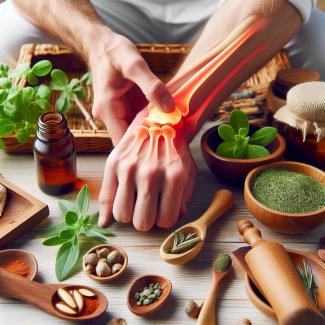
Arthritis is a term that refers to a group of more than 100 different conditions that primarily affect the joints in the body. These conditions can cause inflammation, pain, stiffness, and swelling in one or more joints, and they can range from relatively mild to severe. Arthritis is one of the most common chronic health problems in the world, and it can affect people of all ages, genders, and backgrounds. Here, I'll describe arthritis in more detail.
Types of Arthritis:
- Osteoarthritis: This is the most common form of arthritis, and it typically occurs as a result of wear and tear on the joints over time. Osteoarthritis can affect any joint but is most commonly seen in the knees, hips, hands, and spine. It is characterized by the breakdown of joint cartilage, which leads to pain and reduced mobility.
- Rheumatoid Arthritis: This is an autoimmune disease where the body's immune system attacks the synovium, the lining of the membranes that surround the joints. It can affect multiple joints and often results in joint deformities and damage if left untreated.
- Psoriatic Arthritis: This type of arthritis is associated with psoriasis, a skin condition. It affects the joints and can cause joint pain, stiffness, and swelling. Psoriatic arthritis can vary in severity.
- Ankylosing Spondylitis: This is a type of inflammatory arthritis that primarily affects the spine and sacroiliac joints. Over time, it can cause the vertebrae to fuse, leading to a loss of flexibility and mobility.
- Gout: Gout is caused by the buildup of uric acid crystals in the joints, often in the big toe. It can result in sudden and severe attacks of pain and swelling.
- Juvenile Arthritis: This term encompasses various forms of arthritis that affect children and adolescents. Juvenile idiopathic arthritis (JIA) is the most common, and it can have different subtypes.
- Systemic Lupus Erythematosus (SLE): Lupus is an autoimmune disease that can affect various parts of the body, including the joints. Joint pain and inflammation are common symptoms of lupus.
Symptoms: The symptoms of arthritis can vary depending on the specific type of arthritis, but common symptoms include:
- Joint pain
- Joint stiffness
- Joint swelling
- Redness and warmth around the affected joints
- Decreased range of motion
- Fatigue
- Muscle weakness
- Fever (in some types of arthritis, like rheumatoid arthritis)
- Joint deformities (in advanced cases)
Causes: The causes of arthritis depend on the specific type, but common risk factors and triggers can include:
- Genetics: Some forms of arthritis have a genetic component, making individuals more susceptible if their family members have the condition.
- Age: Osteoarthritis is often associated with aging and wear and tear on the joints.
- Autoimmune Factors: Conditions like rheumatoid arthritis and lupus involve the body's immune system mistakenly attacking healthy joint tissues.
- Infections: Certain infections can trigger reactive arthritis, causing joint inflammation.
- Lifestyle Factors: Obesity, joint injuries, and overuse of joints can increase the risk of developing arthritis.
Treatment: Arthritis treatment aims to relieve pain, reduce inflammation, and improve joint function. Depending on the type and severity of arthritis, treatment options may include:
- Medications: Pain relievers, anti-inflammatory drugs, disease-modifying antirheumatic drugs (DMARDs), and biologics.
- Physical Therapy: Exercises and techniques to improve joint function and reduce pain.
- Lifestyle Modifications: Weight management, joint protection, and assistive devices.
- Injections: Corticosteroid injections or hyaluronic acid injections into affected joints.
- Surgery: Joint replacement surgery in severe cases.
- Alternative Therapies: Complementary approaches such as acupuncture and dietary supplements may be considered.
Arthritis is a chronic condition that requires ongoing management, and the treatment approach is tailored to the individual's specific needs and the type of arthritis they have. Early diagnosis and intervention are essential to manage the condition effectively and improve the quality of life for those affected. It's important to consult with a healthcare professional for an accurate diagnosis and treatment plan if you suspect you have arthritis.
How can we treat arthritis?
Arthritis is a common condition characterized by inflammation of the joints, which can lead to pain, stiffness, and reduced mobility. While there is no cure for arthritis, there are various treatment approaches to manage the symptoms and improve the quality of life for those affected. Treatment options include both medical and non-medical approaches. Here, I'll describe various ways to treat arthritis and alleviate joint pain, including non-drug methods and foods that may help:
- Non-Drug Treatment for Arthritis: a. Physical Therapy: A physical therapist can design an exercise program tailored to your specific needs to improve joint flexibility and strength. b. Occupational Therapy: Occupational therapists can help you learn to perform daily activities with minimal stress on your joints. c. Assistive Devices: Devices like braces, splints, and canes can help reduce joint strain and pain. d. Hot and Cold Therapy: Applying heat or cold to the affected joints can help alleviate pain and inflammation. e. Weight Management: Maintaining a healthy weight can reduce stress on your joints, especially in weight-bearing joints like the knees and hips. f. Rest: Adequate rest and joint protection are essential to prevent overuse and reduce inflammation.
- Diet and Nutrition: Certain foods and dietary choices may help manage arthritis symptoms. These include: a. Omega-3 Fatty Acids: Foods rich in omega-3 fatty acids, such as fatty fish (salmon, mackerel), flaxseeds, and walnuts, have anti-inflammatory properties. b. Antioxidant-Rich Foods: Berries, cherries, and foods high in vitamin C (e.g., citrus fruits) can help reduce inflammation. c. Turmeric and Ginger: These spices have anti-inflammatory properties and may provide relief. Turmeric can be consumed in curries or taken as a supplement. d. Olive Oil: Extra virgin olive oil contains compounds that may help reduce inflammation. e. Green Tea: Green tea is rich in antioxidants that may have anti-inflammatory effects. f. Cruciferous Vegetables: Broccoli, cauliflower, and Brussels sprouts contain sulforaphane, which may help reduce inflammation.
- Herbal Supplements: Some herbal supplements are believed to offer relief from arthritis pain, though scientific evidence is often limited. These include: a. Boswellia: An herb derived from the Boswellia serrata tree, known for its anti-inflammatory properties. b. Devil's Claw: A plant used in traditional medicine for pain relief. c. Turmeric and Curcumin: Turmeric is known for its anti-inflammatory properties, and curcumin is its active compound. d. Ginger: Ginger has anti-inflammatory and analgesic properties.
- Alternative Therapies: Some individuals find relief through alternative therapies like acupuncture, acupressure, or chiropractic care. Consult with a healthcare professional before trying these approaches.
It's essential to remember that the effectiveness of non-drug methods and dietary changes can vary from person to person. If you're considering incorporating any dietary changes or supplements into your arthritis management plan, it's crucial to consult with a healthcare provider or a registered dietitian to ensure they are safe and appropriate for your specific condition.
In many cases, a comprehensive approach that combines non-drug strategies with medical treatments, such as over-the-counter or prescription medications, may be the most effective way to manage arthritis symptoms and pain. Your healthcare provider can help you develop a personalized treatment plan based on your specific type of arthritis, its severity, and your individual needs.
Which plant or food can help relieve arthritis pain? How do I use them?
Certain plants and foods have been associated with potential anti-inflammatory and pain-relieving properties that may help alleviate arthritis pain. While these foods can be beneficial, it's essential to remember that they are not a replacement for medical treatment, and individual responses can vary. Here are some foods and plants that may help relieve arthritis pain, along with ways to incorporate them into your diet:
- Turmeric and Curcumin:
- Turmeric is a bright yellow spice commonly used in Indian and Asian cuisine. It contains an active compound called curcumin, known for its anti-inflammatory properties.
- Use turmeric in your cooking by adding it to curries, soups, stews, or rice dishes. You can also make a turmeric tea or turmeric milk by mixing a teaspoon of turmeric with hot milk or water.
- Curcumin supplements are available but should be used with caution and under the guidance of a healthcare professional due to potential interactions and side effects.
- Ginger:
- Ginger is another spice with anti-inflammatory and analgesic properties.
- Add fresh or ground ginger to your meals, including stir-fries, smoothies, and teas. Ginger tea can be made by steeping fresh ginger slices in hot water.
- Fatty Fish:
- Fatty fish like salmon, mackerel, and sardines are rich in omega-3 fatty acids, which have anti-inflammatory properties.
- Aim to incorporate fatty fish into your diet at least twice a week. Baking, grilling, or steaming fish are healthy cooking methods.
- Berries:
- Berries, such as strawberries, blueberries, and raspberries, are packed with antioxidants that can help reduce inflammation.
- Enjoy berries as a snack, add them to yogurt or oatmeal, or blend them into smoothies.
- Extra Virgin Olive Oil:
- Extra virgin olive oil contains compounds with anti-inflammatory effects.
- Use olive oil as a salad dressing or for sautéing vegetables. It can also be drizzled over pasta or used as a dip for bread.
- Cruciferous Vegetables:
- Vegetables like broccoli, cauliflower, and Brussels sprouts contain sulforaphane, which may help reduce inflammation.
- Steam, roast, or stir-fry these vegetables as a side dish or add them to your favorite recipes.
- Cherries:
- Cherries are known for their anti-inflammatory and pain-relieving properties, especially for gout-related arthritis.
- You can eat cherries fresh, frozen, or as cherry juice. Aim for a cup of cherries daily, if possible.
- Green Tea:
- Green tea is rich in antioxidants, including epigallocatechin-3-gallate (EGCG), which may have anti-inflammatory effects.
- Drink green tea regularly, either hot or cold, to reap its potential benefits.
It's important to maintain a balanced and varied diet, including these foods, to maximize their potential benefits. You can work with a registered dietitian to develop a meal plan that incorporates these anti-inflammatory foods while meeting your nutritional needs.
Remember that dietary changes alone may not provide complete relief from arthritis pain. Consult with your healthcare provider for a comprehensive approach to managing arthritis, which may include medication, physical therapy, and other treatments in addition to dietary modifications.






